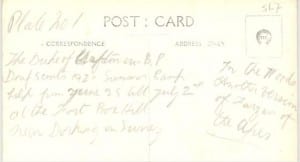“After a great struggle he managed to rescue her” – George Biddle (b.ca. 1912)
By H Dominic W Stiles, on 24 January 2020
I came across yet another example of a Deaf person who heroically rescued a drowning person – George Biddle (b.ca. 1912) of Glasgow.
DEAF AND DUMB HERO Award to Glasgow Rover Scout The Silver Cross for Gallantry has been awarded to a deaf and dumb Rover Scout, George Biddle, aged 24, of the 154th Glasgow (Handicapped) Group, by the Boy Scouts Association for his outstanding bravery in rescuing a woman from drowning in the River Clyde at Bridge Wharf, Broomielaw, Glasgow, at mid-day on March 12. Biddle was cleaning a car when a man drew his attention by making signs and pointing to the water. Seeing the woman in the water, Biddle unhesitatingly took hold of a lifebelt and jumped in fully clothed and with heavy boots on. He caught hold of the woman, and the men on the side pulled them to the bank by the rope of-the lifebelt , which he had left attached to the ring. (The Scotsman – Wednesday 27 May 1936)
The Magazine for the Scottish Deaf covered the story –
The deaf are in the news, and for this we have to thank George Biddle, who at great personal risk saved a woman from drowning in the Clyde on 12th March. It appears that the woman for no apparent reason jumped into the river. Immediately George, without any hesitation, got hold of a lifebelt and dived in fully clothed and with heavy boots on. After a great struggle he managed to rescue her.
Feeling that public interest might be awakened as a result, here are some extracts from a letter sent to the Press :—
” It may be of interest to the public to know that the young man is a member of the Glasgow Mission to the Deaf and Dumb, and also, for 7 years, of the 154th Glasgow Crew of Deaf and Dumb Rover Scouts, attached to the Mission.
There can be no doubt that Biddle’s alertness and quick thinking saved the woman from death, and he deserves every credit for his gallant action. It should be noted that while there were several hearing people on the scene, it was left to one who is deaf and dumb to play the part of rescuer. My object in writing is to emphasise that the deaf can be as alert, and at times even more so, than others with all their faculties, a fact which is unfortunately very often overlooked.
There are many kids in and around Glasgow of Biddle’s type who, for lack of understanding on the part of employers, have been given no chance of finding their place in the industrial world.
Unemployment is the most acute problem the deaf, particularly the younger people, have to face, and I hope that, as the result of this incident, there will be a better understanding of the character of the deaf. I particularly appeal to employers to follow the excellent example of Messrs Taggarts, the well-known motor agents, who are Biddle’s employers.”
Well done, George! (Magazine for the Scottish Deaf, 1936, vol.6 (3) p.45)
As a scout, I am pretty sure he must be in this photo from 1928 of the 154th scouts. I have no more information about George – do contribute if you can!
 Close
Close










